- About

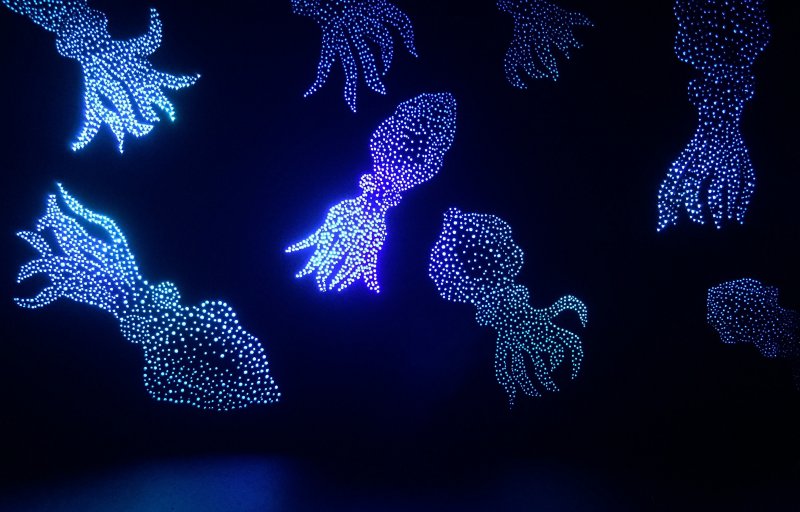 Firefly Squid by Lucy Lier
Firefly Squid by Lucy Lier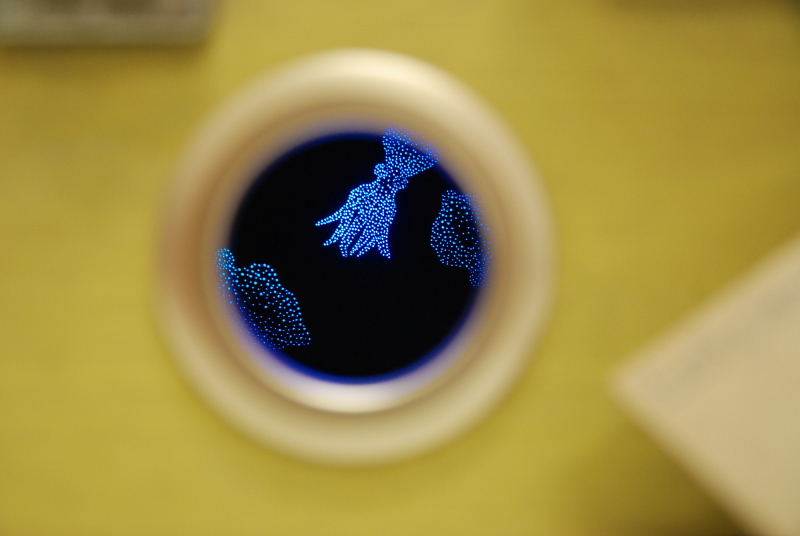 Close up of Firefly Squid by Lucy Lier
Close up of Firefly Squid by Lucy Lier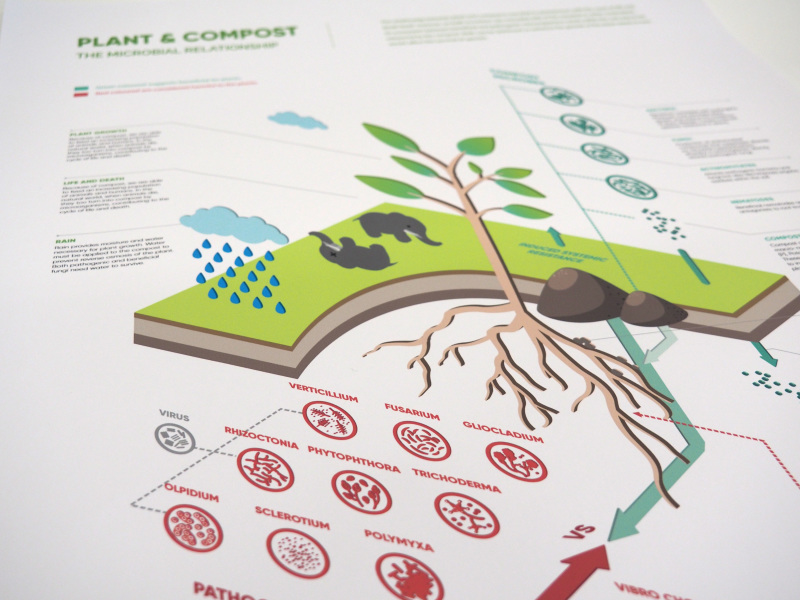 3. Zoo Poo Microbial Life by Erin Tan and Kirsten Carless (Zoo Poo & You Studio)
3. Zoo Poo Microbial Life by Erin Tan and Kirsten Carless (Zoo Poo & You Studio)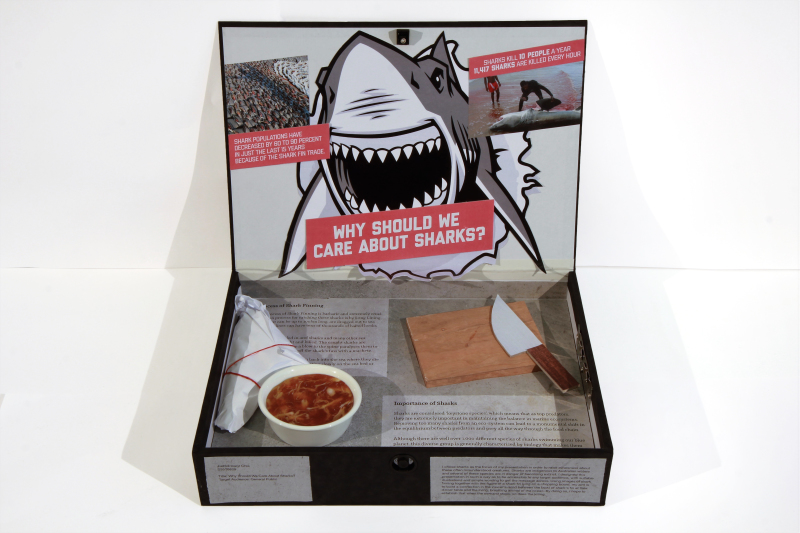 Shark Finning by Daryl Chia (Urban Nature Studio)
Shark Finning by Daryl Chia (Urban Nature Studio)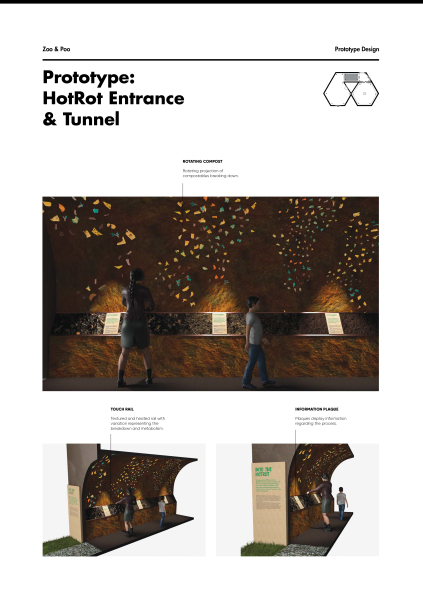 Composting Tunnel Experience from Turning A New Leaf by Jennifer Mai (Zoo Poo & You Studio)
Composting Tunnel Experience from Turning A New Leaf by Jennifer Mai (Zoo Poo & You Studio)Bay Love
—Tania Ivanka & Toni RobertsSTRATEGY
Tuesday - 9.00 - 12.00, Tuesday - 1.00 - 4.00
*See myTimetable for Room & TimeStudio Inquiry
The Marine and Freshwater Discovery Centre (MFDC), Queenscliff provides education and eco-tourism services about the plants and animals that inhabit our coast and marine environment. Using systems thinking and interpretive design practice you will investigate the marine life in Port Phillip Bay and explore how to engage and communicate with a selected audience in an ecological understanding of the intricate relationship of marine creatures to each other and human beings.EngagementEnvironmental communication research identifies that information is not enough to persuade people to change their behaviour. Design plays an important role by engaging people through emotion and values and deep understanding of ecological relationships that drive actions. This studio draws together theory on interpretation design and systems and ecological thinking to inform design outcomes. Research will be undertaken through field trips, observations, prototype testing and development. You will propose design outcomes and full design mockups to the partner organisations, together with rationales that explain the underpinning research and knowledge. The selection of suitable forms will be defined by the studio's inquiry, audience and context. Depending on the resources of the Discovery Centre, some of the design proposals may be produced for public display and interaction.Communication of knowledgeWe will use Interpretive design as the key practice, and systems thinking and mapping to support our understanding of environmental and ecological issues. You will design artefacts and experiences that communicate complex and invisible concepts to the audience. Final works might be digital or physical, installation, sculptural or play or game based. Students will develop and present concepts through a range of methods including material experiments, rough prototypes and high quality design mockups to communicate design ideas and intentions.ActivitiesWe will undertake a broad range of activities throughout the semester to build your knowledge and understanding of marine life in Port Phillip Bay and building your capacity for systems thinking, living systems and complexity. To do this successfully it is essential that you engage in and contribute to deep discussions in class on these themes. You must also be willing and available to travel for a range of field trips around Melbourne and Port Phillip Bay, possibly including Queescliff (requiring and early start and late finish with a bus trip provided), Williamstown, St Kilda Beach, and Melbourne Museum. Reflective tasks and assessment tasks are based on these discussions and field trips, so the quality of your design thinking will be impacted if you do not participate in these activities. Please consider your personal and work commitments before selecting this studio. We will also make use of available production methods including the library makerspace and Comm Design Roland plotter.AssessmentsThere are four assessment tasks for this studio. Each brief includes milestone deliverables that are interconnected and build upon each other. Brief 01: Studio Knowledge Object and reflective artefacts journal Brief 02: Research folio and minor interpretive design Brief 03: Major Interpretive design concept proposal and design prototypePre-ReadingThe Designer's Challenge: Four Problems You Must Solve David W. Orr https://www.ecoliteracy.org/article/designers-challenge-four-problems-you-must-solve# Baykeepers – Short Documentary Film https://youtu.be/rhA6sj66K5w Teaching Children To See The Systems All Around Us https://www.ecoliteracy.org/article/teaching-children-see-systems-all-around-us#Studio PartnerMarine and Freshwater Discovery Centre (MFDC) Queenscliff, Victorian Fisheries Authority (VFA)Communities of PracticeDesigning Experiences, Designing for Social Change, Designing Identity, Designing through Image, Designing Publications, Designing DisobedienceLinks